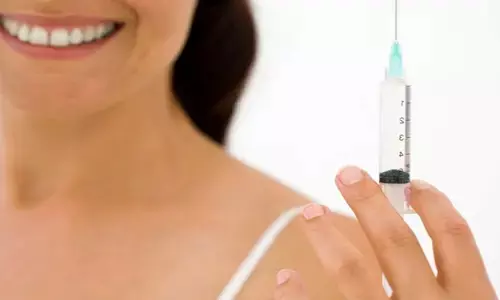- Home
- Medical news & Guidelines
- Anesthesiology
- Cardiology and CTVS
- Critical Care
- Dentistry
- Dermatology
- Diabetes and Endocrinology
- ENT
- Gastroenterology
- Medicine
- Nephrology
- Neurology
- Obstretics-Gynaecology
- Oncology
- Ophthalmology
- Orthopaedics
- Pediatrics-Neonatology
- Psychiatry
- Pulmonology
- Radiology
- Surgery
- Urology
- Laboratory Medicine
- Diet
- Nursing
- Paramedical
- Physiotherapy
- Health news
- Fact Check
- Bone Health Fact Check
- Brain Health Fact Check
- Cancer Related Fact Check
- Child Care Fact Check
- Dental and oral health fact check
- Diabetes and metabolic health fact check
- Diet and Nutrition Fact Check
- Eye and ENT Care Fact Check
- Fitness fact check
- Gut health fact check
- Heart health fact check
- Kidney health fact check
- Medical education fact check
- Men's health fact check
- Respiratory fact check
- Skin and hair care fact check
- Vaccine and Immunization fact check
- Women's health fact check
- AYUSH
- State News
- Andaman and Nicobar Islands
- Andhra Pradesh
- Arunachal Pradesh
- Assam
- Bihar
- Chandigarh
- Chattisgarh
- Dadra and Nagar Haveli
- Daman and Diu
- Delhi
- Goa
- Gujarat
- Haryana
- Himachal Pradesh
- Jammu & Kashmir
- Jharkhand
- Karnataka
- Kerala
- Ladakh
- Lakshadweep
- Madhya Pradesh
- Maharashtra
- Manipur
- Meghalaya
- Mizoram
- Nagaland
- Odisha
- Puducherry
- Punjab
- Rajasthan
- Sikkim
- Tamil Nadu
- Telangana
- Tripura
- Uttar Pradesh
- Uttrakhand
- West Bengal
- Medical Education
- Industry
Vaginal hyaluronic acid could be an effective in treating genitourinary syndrome of menopause: Study

A new study conducted by Surbhi Agrawal and team unveiled no discernible clinical variations among vaginal hyaluronic acid (HLA) and vaginal estrogen after a 12-week period in terms of treating genitourinary syndrome of menopause (GSM). The findings of this study were published in the journal Menopause.
A broad range of symptoms pertaining to lower urinary tract, sexual, and vulvovaginal health are included in the genitourinary syndrome of menopause. Vaginal estrogen has been demonstrated in several trials to improve both objective and subjective GSM assessments. Also, a number of trials have also demonstrated that vaginal estrogen has a tolerable safety profile, with increased vaginal discharges and vaginal itching being the most frequent adverse effects. There are obstacles that prevent the widespread use of vaginal estrogen for GSM, even in spite of the strong evidence in favor of it. This study compared the effectiveness of vaginal hyaluronic acid, a non-hormone option, with vaginal estrogen, the usual treatment for genitourinary syndrome of menopause.
This pilot study compared the primary endpoint, the vulvovaginal symptom questionnaire (VSQ) score, where women with GSM were randomized to receive either vaginal estrogen cream or an HLA vaginal suppository for a period of 12 weeks. The female sexual function index (FSFI), the vaginal pH, the vaginal symptom index (VSI), the patient's global impression of improvement (PGI-I) at follow-up, and the visual analog scale (VAS) for dyspareunia, vaginal itching, and vaginal dryness were among the secondary outcomes. 95% confidence intervals and the two-sided, two-sample t-test were used to evaluate differences between treatment groups.
After 49 women were randomly assigned, their data was collected at week 12 from 45 individuals which showed no discernible difference in the total VSQ scores of HLA and vaginal estrogen groups. After 12 weeks, both therapy groups showed improvement on the VSQ. Over time, improvements were observed in the VAS score, total VSI score, total FSFI score, and vaginal pH. However, these improvements were consistent across research arms. In both groups, more than 90% of participants reported improvement on the PGI-I. There were no significant adverse effects linked to the therapy. Overall, women with GSM were treated with vaginal estrogen, or HLA reported improvement in symptoms following 12 weeks of therapy, and the degree of improvement was not significantly different.
Reference:
Agrawal, S., LaPier, Z., Nagpal, S., Oot, A., Friedman, S., Hade, E. M., Nachtigall, L., Brucker, B. M., & Escobar, C. (2024). A randomized, pilot trial comparing vaginal hyaluronic acid to vaginal estrogen for the treatment of genitourinary syndrome of menopause. In Menopause. Ovid Technologies (Wolters Kluwer Health). https://doi.org/10.1097/gme.0000000000002390
Neuroscience Masters graduate
Jacinthlyn Sylvia, a Neuroscience Master's graduate from Chennai has worked extensively in deciphering the neurobiology of cognition and motor control in aging. She also has spread-out exposure to Neurosurgery from her Bachelor’s. She is currently involved in active Neuro-Oncology research. She is an upcoming neuroscientist with a fiery passion for writing. Her news cover at Medical Dialogues feature recent discoveries and updates from the healthcare and biomedical research fields. She can be reached at editorial@medicaldialogues.in
Dr Kamal Kant Kohli-MBBS, DTCD- a chest specialist with more than 30 years of practice and a flair for writing clinical articles, Dr Kamal Kant Kohli joined Medical Dialogues as a Chief Editor of Medical News. Besides writing articles, as an editor, he proofreads and verifies all the medical content published on Medical Dialogues including those coming from journals, studies,medical conferences,guidelines etc. Email: drkohli@medicaldialogues.in. Contact no. 011-43720751


